Football sponsorship investment by online trading platforms and crypto & blockchain businesses is booming! The brand sectors combined spending $277m on football sponsorship in 2021/22 (+295% year-on-year increase), making them the 5thbiggest spender, with only mainstream financial services, betting, airlines and automotive brands spending more.
Finance Magnates speaks with Matt House, CEO and Founder of SportQuake (LINK: www.sportquake.com), a sports marketing agency specialising in football sponsorship, to hear his insights into the trend and the reasons why brands continue to invest in football at such pace. Find out more by contacting SportQuake at info@sportquake.com.
Firstly Matt, SportQuake have a long history within the online trading sector. Could you give an overview of your experience in the space?
SportQuake was founded in 2006 in response to changes in the football landscape that were transforming the sport into a global entertainment business. Specifically, I saw the potential for this new football platform as uniquely placed to help a new generation of businesses build out brands quickly and at scale.
Initially, SportQuake pioneered football sponsorship for online betting brands. Then with so many similarities around the business of building online betting brands and those of online trading brands, and with so many proof points around how European football sponsorship had helped build out online betting brands, bringing online trading brands (and now crypto and blockchain brands) into football sponsorship to drive similar goals and growth was very logical.
Over the past 5 years, we have worked with 25+ online trading brands, including eToro, FBS and HotForex, helping them to plan and buy bespoke football sponsorship strategies optimised to achieve their business goals. Most recently, we planned and delivered FBS’s 2021/22 Premier League launch campaign as shirt sponsor of Leicester City.
I'm also a massive blockchain/ crypto advocate at a personal level. I believe it can be a big, important movement and empowerment advance in the way that the internet has been over the past 30+ years, particularly offering huge potential for young people. I’ve been an investor in bitcoin since 2018 and SportQuake is corporately invested since 2020.
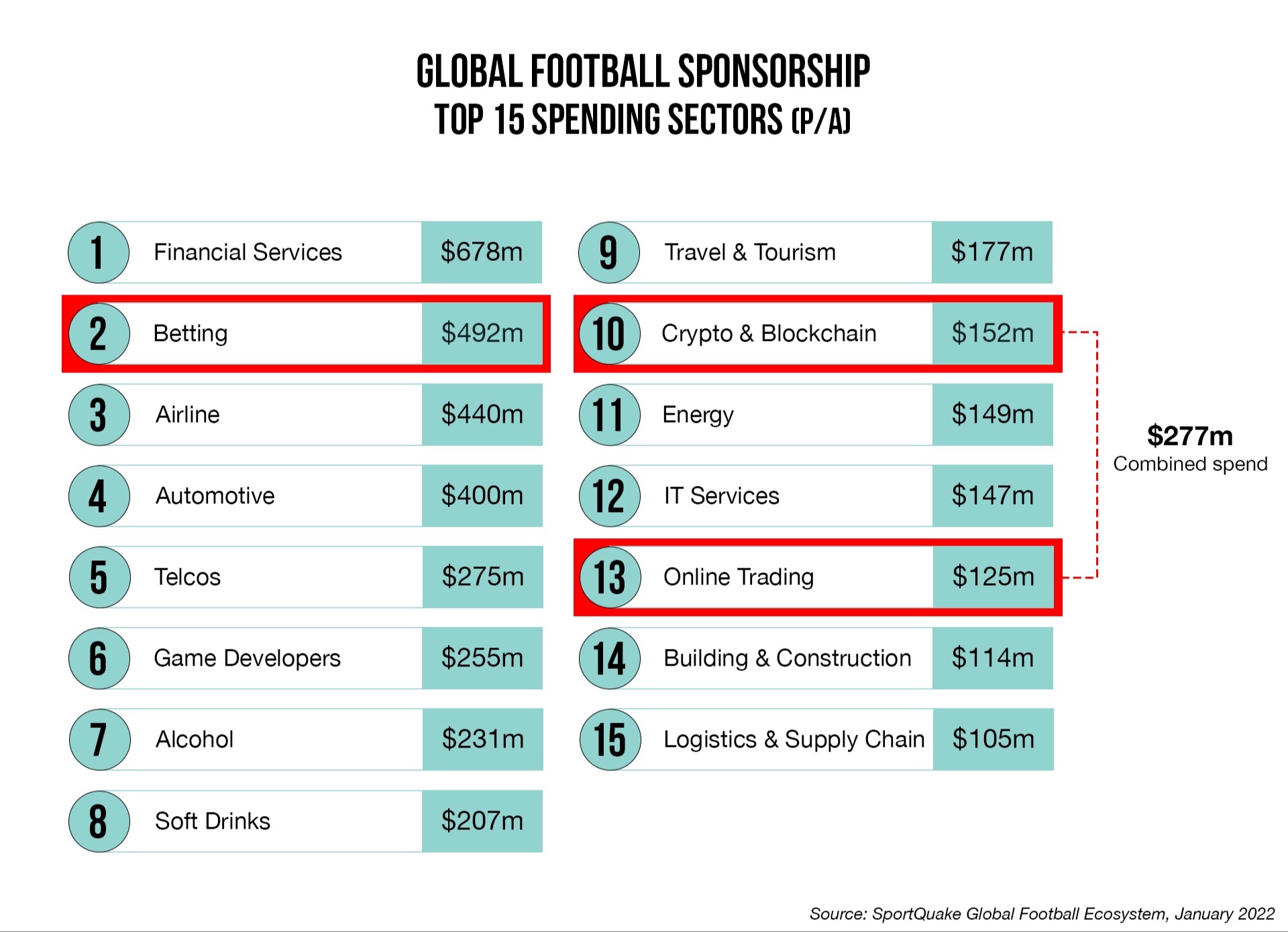
2021 saw continued growth of investment from online trading, crypto and blockchain brands in football sponsorship. What exactly has been happening over the past 12 months and why are brands continuing to invest at such scale?
Online trading investment in football sponsorship has built steadily over the past decade, and the 2021/22 season has seen the sector spend $125m – a 49% year-on-year increase.
This is very healthy growth but has been put in the shade by the big headlines created by the crypto and blockchain businesses, jumping on football (and other sports sponsorship) as a brand building platform, spending $150m+ on football sponsorship from a standing start in 2020.
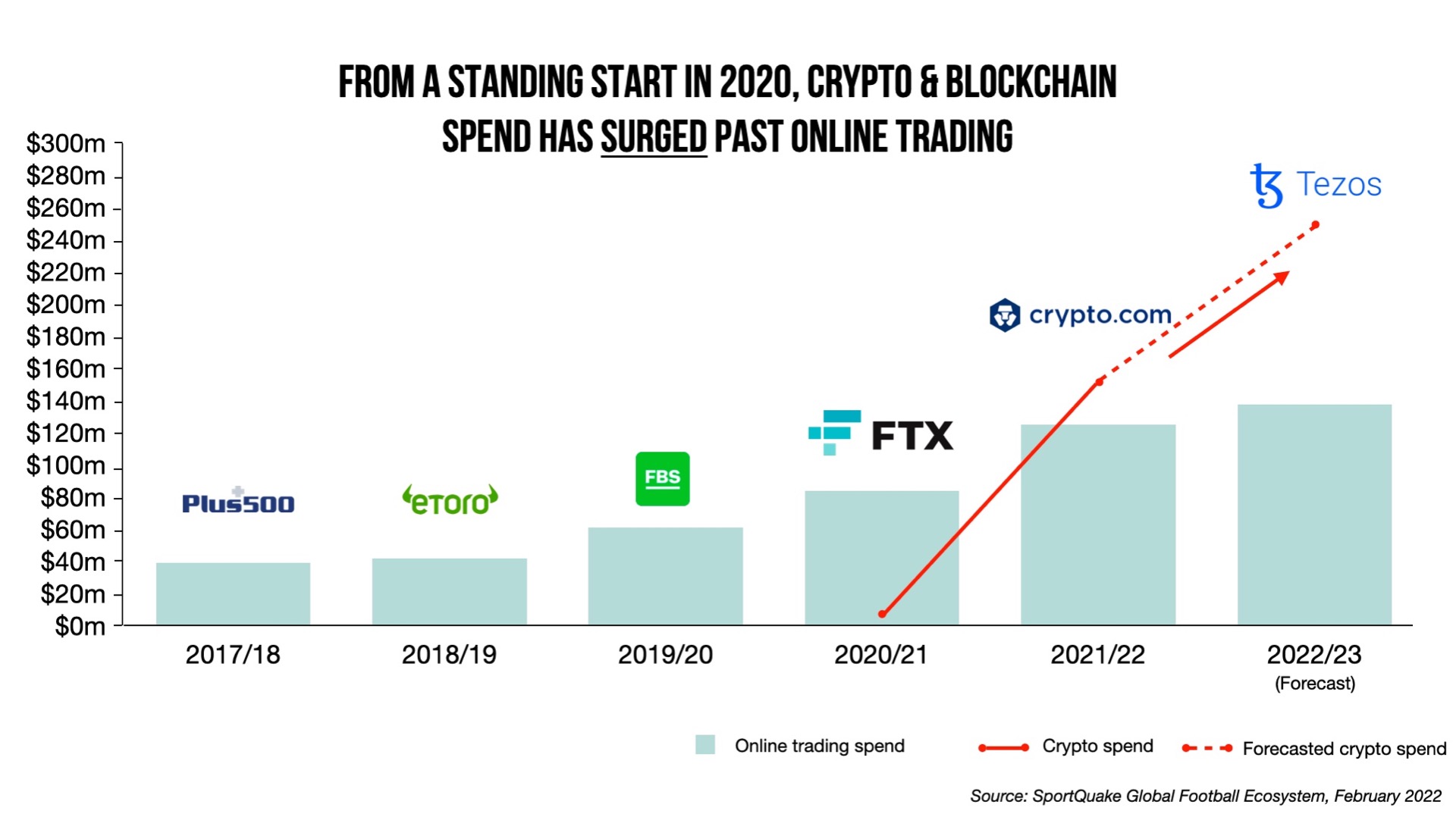
What we are seeing here is that football sponsorship is now a key part of the marketing tool kit for building multi-market, digital-first brands.
These businesses are attracted by football’s huge popularity and it’s multiple proof points around both launching and building out new transactional businesses at scale, across multiple brand sectors, including betting, trading, mobile games, food delivery and so on.
Football sponsorship provides these brand marketing teams with a platform to provide huge launch impact and ongoing dialogue across key markets through premium TV, digital and social integrations, driven by the world’s most engaging names and faces, including leagues, teams and player IP.
Crypto and blockchain brands have understood this from the get-go and have run with this.
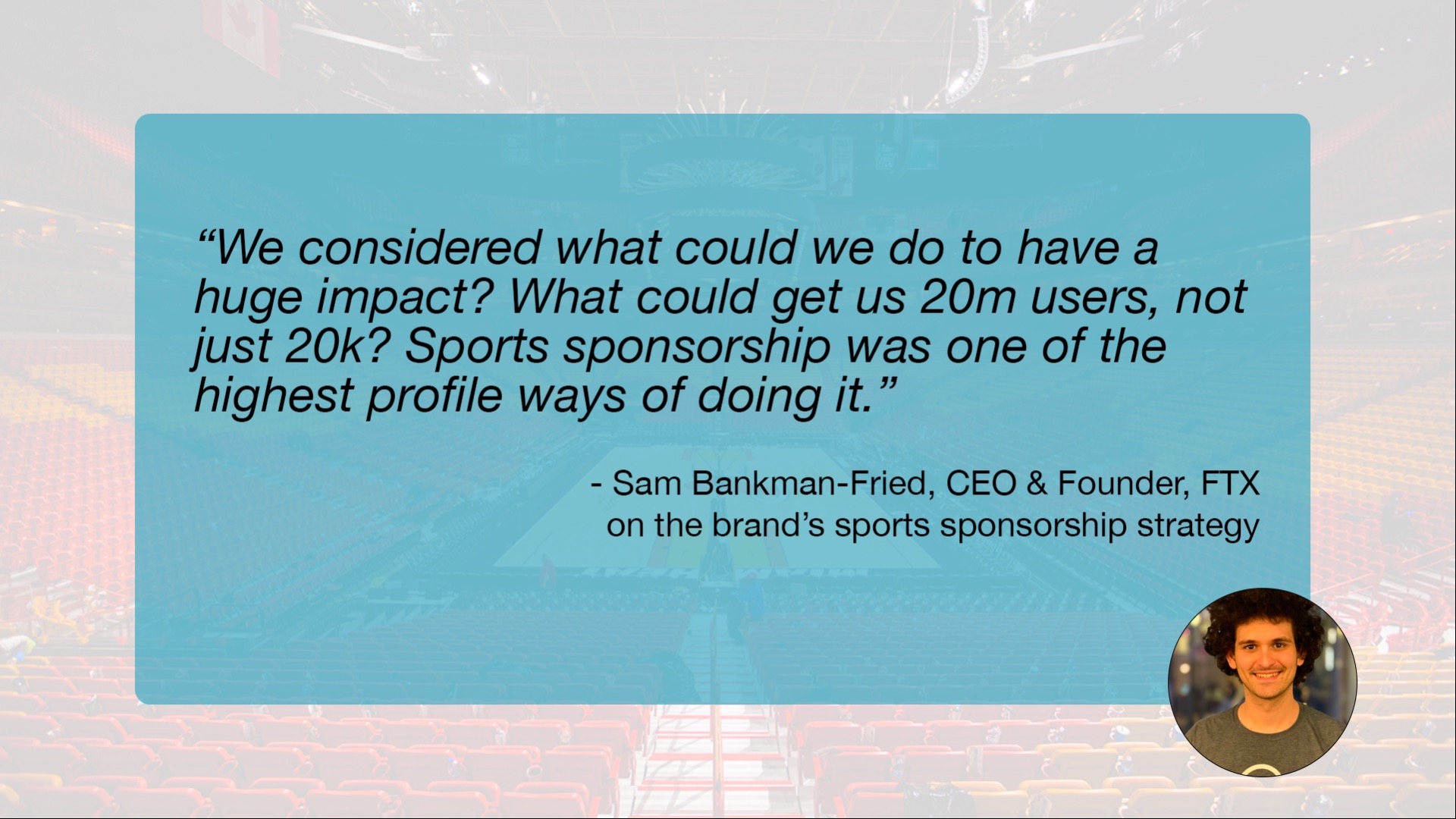
Of all the current active sponsorships, are there any that may be of particular interest to our readers?
Tezos’s recent deal to become Manchester United’s training wear partner in a deal worth a reported $27m p/a is very high profile, very fresh and very notable. This is the highest profile move by a blockchain network so far, given Manchester United’s position as arguably the biggest club in the world and the premium nature of their uniform sponsorship. The partnership is up there with the biggest statements any brand can make in world football.
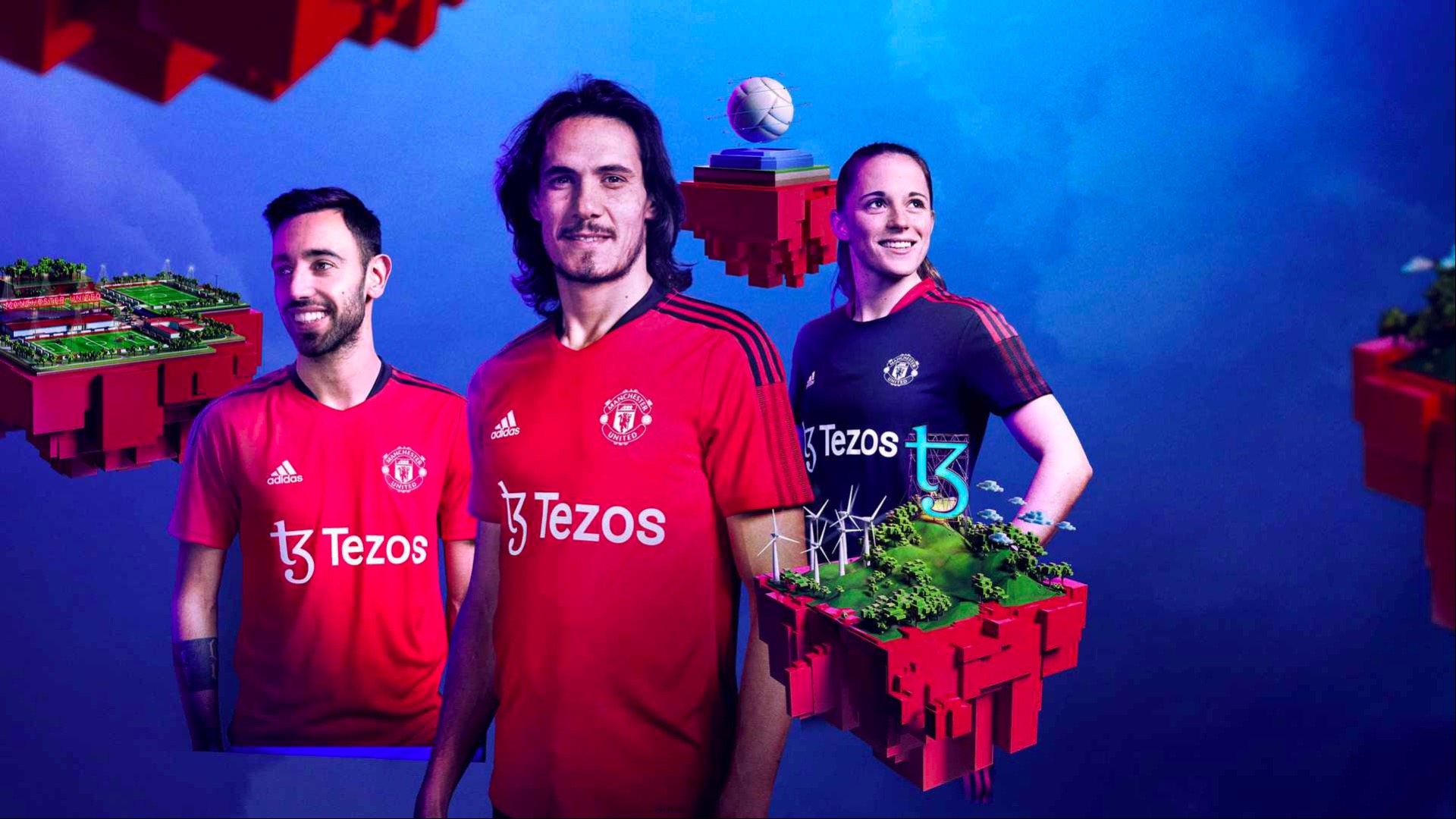
Looking at the wider sector, eToro continues to be a really important industry case study. The team there have built a fantastic business over the past 15 years, with 20m+ customers now across 140 countries. They have a great business, they have a great brand, they are looking to IPO and are very much looked up to by the online trading, crypto and blockchain industries. Football has played an important part in helping them to do this.
SportQuake started to work with eToro back in 2017. As the first big mainstream bitcoin bull run gripped the world, we developed a football sponsorship strategy together to capitalise on bitcoin’s mass coverage in a unique, attention-grabbing way, using the Premier League’s global platform to spread eToro’s mission, incl. paying for the sponsorship in bitcoin.
Since that initial deal, the brand has expanded on this Premier League strategy across Europe and, just a few short years later, have 25+ football partnerships spanning the largest leagues and clubs in Europe.
With LED and interview backdrop coverage at all games, as well as extensive digital rights on club-owned channels, the strategy provides eToro with a high-density, ‘always on’ marketing platform to engage football fans across the world.
This 10X investment from a standing start is not for fun. The eToro team are amongst the smartest in the business and have increased football investment because it makes real cost-effective impact throughout their marketing funnel across key markets.
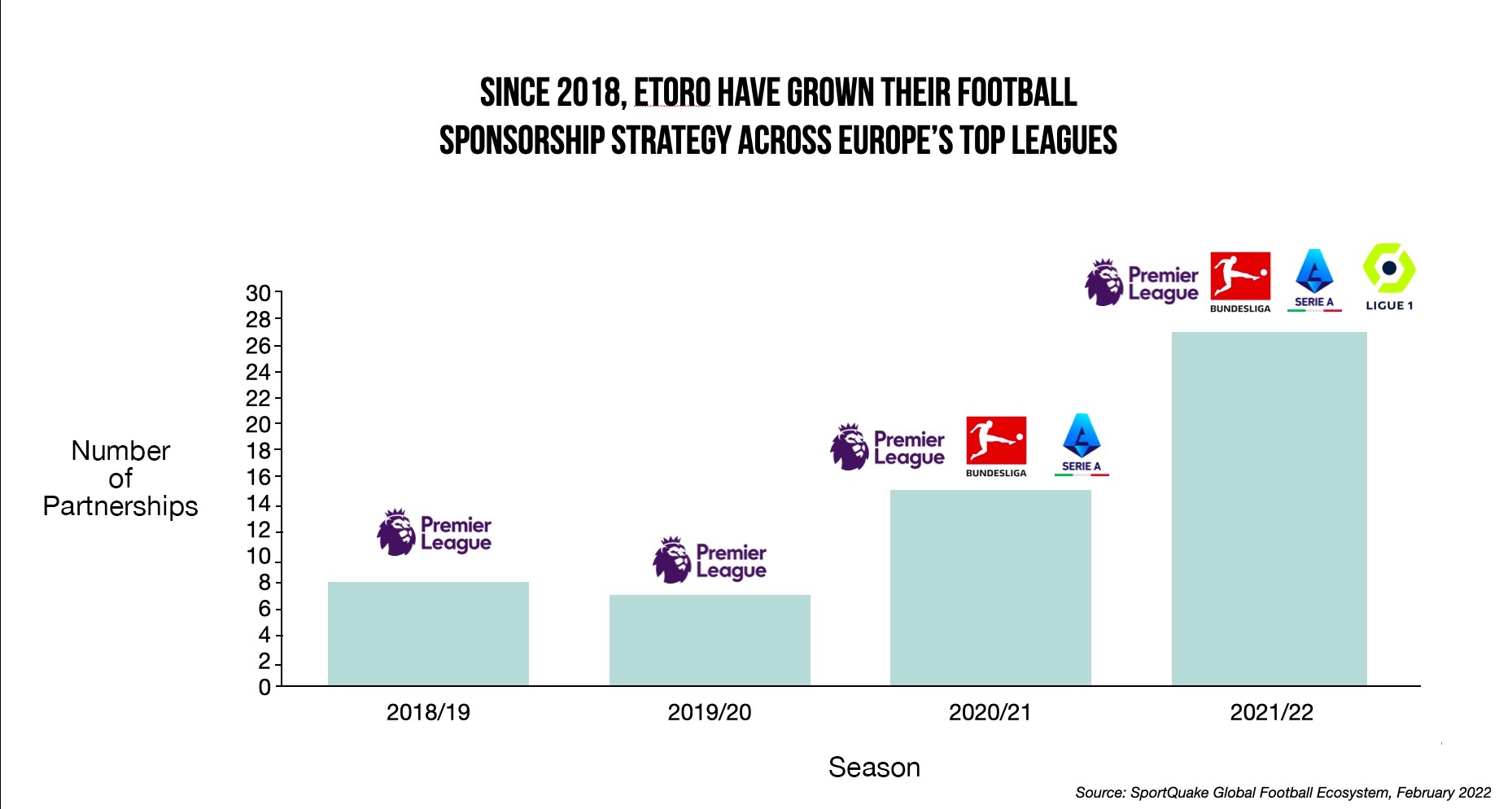
Having been at the heart of online trading’s growth in football, how is the trend changing and developing?
It’s going to get bigger quickly but there are some important nuances.
If we consider the classic adoption cycle, online trading platforms are entering the late majority phase of adoption. Brands have been investing for 10+ years and there has been a lot of experimentation - different strategies, different budgets, different proof points. Most brands in the sector have now used football and key players have emerged who are investing heavily behind it. The market is mature, but we still estimate growth in 2022/23 of between 10-25% p/a, driven by the key players.
Crypto and blockchain on the other hand is still very early in the adoption cycle. Whilst it has become very big, very fast we estimate it will quickly go onto become one of the mega sectors, in its own right, driven by the following factors:
· Crypto and blockchain networks disrupting everything, starting with mainstream financial trading and investment services
· The large number of sectors that will be disrupted, with new brands spending to establish themselves (we have currently only seen crypto exchanges, blockchain networks, tokens and NFT’s flex)
· Multiple marketing proof points for football sponsorship
· Increased understanding by football rights owners that this isn’t a gimmick or something sinister. This is a big movement that has great synergies with their businesses, subject to a proper due diligence and understanding
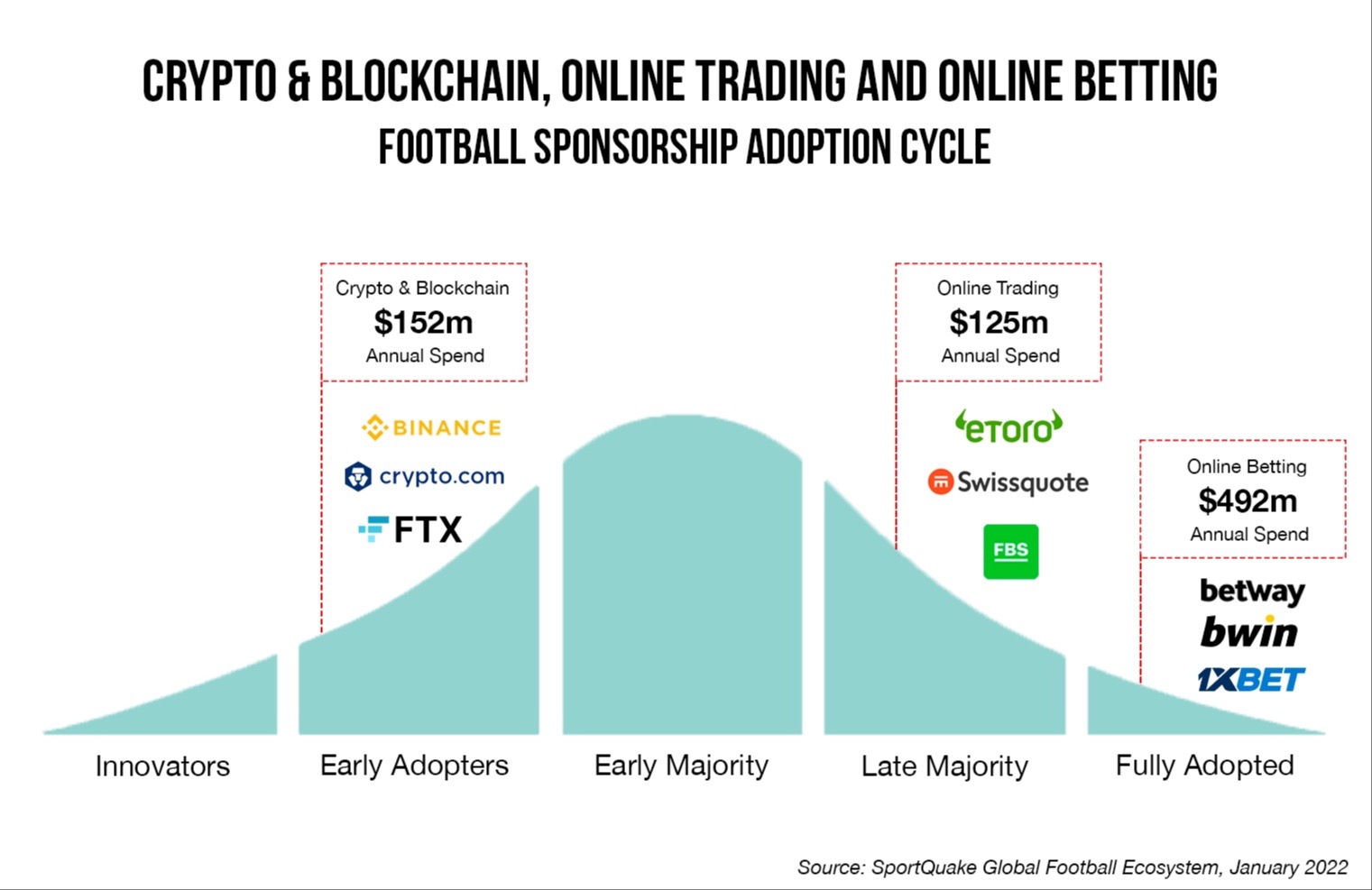
The main headwind is regulation. For example, in the UK, crypto exchanges fall under FCA regulation where the FCA’s recent advice that they will not approve new licenses or issue new promotional guidelines until later in 2022 has had a direct impact on Premier League sponsorship from new operators who fall under the FCA’s mandate.
This decision restricts Premier League sponsorship during this review period to those FCA regulated crypto products who already have an FCA licence and those businesses like Tezos who, as a blockchain network, operate outside of the current scope of the FCA.
Meaning in the short-term, new brands that fall under the FCA’s jurisdiction will have to satisfy themselves with the best of European and world football until they have a better understanding of FCA licensing and regulations strategy later this year.
 financemagnates.com
financemagnates.com
